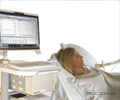Scientists have found that an adult stem cell present in muscle is responsive to exercise - a discovery that could lead to new therapeutic techniques to treat injured muscle and prevent

University of Illinois researchers, led by kinesiology and community health professor Marni Boppart, investigated whether MSCs also responded to strain during exercise, and if so, how.
"Since exercise can induce some injury as part of the remodeling process following mechanical strain, we wondered if MSC accumulation was a natural response to exercise and whether these cells contributed to the beneficial regeneration and growth process that occurs post-exercise," said Boppart, who also is affiliated with the Beckman Institute for Advanced Science and Technology at the U. of I.
The researchers found that MSCs in muscle are very responsive to mechanical strain. They witnessed MSC accumulation in muscle of mice after vigorous exercise.
Then, they determined that although MSCs don't directly contribute to building new muscle fibers, they release growth factors that spur other cells in muscle to fuse and generate new muscle, providing the cellular basis for enhanced muscle health following exercise.
"These findings are important because we've identified an adult stem cell in muscle that may provide the basis for muscle health with exercise and enhanced muscle healing with rehabilitation/movement therapy," Boppart said.
Advertisement
Next, the group hopes to determine whether these cells contribute to the decline in muscle mass over a person's lifetime. Preliminary data suggest MSCs become deficient in muscle with age. The team hopes to develop a combinatorial therapy that utilizes molecular and stem-cell-based strategies to prevent age-related muscle loss.
Advertisement
Source-ANI















